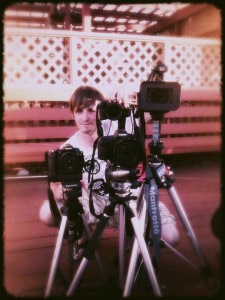 I am asked on a regular basis what cameras I use and what cameras that I recommend. In regards to the type of camera I use, this always depends on what I am shooting. Right now, for most of my personal shorts I am still using Canon 5D Mark II’s & III’s. However, I do use other cameras for my personal shorts. It always depends on the story I am trying to tell.
I am asked on a regular basis what cameras I use and what cameras that I recommend. In regards to the type of camera I use, this always depends on what I am shooting. Right now, for most of my personal shorts I am still using Canon 5D Mark II’s & III’s. However, I do use other cameras for my personal shorts. It always depends on the story I am trying to tell.
As for what camera I recommend, this is one question that I rarely answer because of all the variables that exist. There is no perfect camera for any situation – although some are pretty damn good!
What is your budget? How are you wanting to capture this story? How are you planning to use the camera to tell your story? These are just a couple of the questions you will want to consider.
Why I do not answer the question ‘What camera should I buy?’
There are a few different reasons:
- Days are just too short. I wish I had the time to answer every question based upon each person’s scenario but there just isn’t enough time in a day.
- First hand experience. Before I can give an educated recommendation, I need to try out the cameras. Unfortunately, I do not have either the time or budget to make this feasible.
- Too many variables. Although I could try and walk through every aspect of your specific needs, there is no way to completely understand your direct needs. Ultimately, this decision must be an educated one and it is almost impossible to determine the perfect camera with 100% confidence. In most cases, the best camera is the one you have access to.
Where do I start?
There are a few different things you can do to help yourself make an educated decision. You will want to break down your specific needs and then do some research online for equipment that will fit these needs. Below are a few questions you should ask:
- BUDGET: What is your budget?
- CREW: What size of crew will you have?
- CONTENT: What are the types of films you will be producing?
- STORY: What types of stories are you wanting to tell?
- STYLE: What style of film are you producing (Doc, Narrative, Commercial, etc.)?
- AUDIO: How are you going to record audio?
- LIGHTING: Will you be lighting these films?
- DELIVERABLES: How are you hoping to deliver your films (WEB, 4k, DVD, ETC)?
Digging a Little Deeper
1. Determine Your Needs: It is your responsibility to fully understand your needs before deciding to purchase a camera. Attached are a few more questions you NEED to ask yourself before purchasing a camera.
- What do you need the camera for?
- What type of projects will you be doing with the camera?
- What conditions / environment will you be shooting in?
- What experience level do you have?
- What type of features are you looking for?
- What form factor are you looking for?
2. Determine Your Budget: The next thing you will need to consider is your budget and this is the best way to help direct you towards the right decision. This may not be as simple of an answer as you may think it is. There are two schools of thought when it comes to this question:
- Buy What You Can Afford Now: The first school of thought is to buy a camera that you can afford NOW so you can start capturing the stories you want to tell. Although the camera you choose may not be the best solution for the job, it is really the story that matters anyways. With this method, you are able to get out there and shoot whenever you want.
- Buy Later – The Right Camera For The Right Job: The second school of thought is to save up for the camera you really need for your work and/or simply hire in a camera (or borrow) for every job. If you cannot afford the camera you need, rent until you can. Rentals do get expensive but these costs should be built into your quote, even if you own the camera. If you find yourself hiring in a camera on a frequent basis, I highly recommend purchasing a camera and absorbing these costs when you are busy. When the camera is paid off, you will then have income to use on your future camera. This method will help future proof yourself to an extent BUT the camera will still only last so long before the work pushes you to upgrade.
3. Keep in Mind the Additional Accessories: Depending on the camera you buy and the type of shoot you are wanting to do, you may also need to determine what extra accessories you will need to get the camera up and running or to get it to perform the way you want it to (filters, media, batteries, etc). Take RED cameras as an example. You can get your feet wet for $7,950 BUT you need to spend at least $2,000 to get the camera operational.
4. Future Proofing Your Kit: One of the hardest elements to fully comprehend is how to future proof your kit. Don’t worry about future proofing your camera. Rather, find ways to purchase accessories that will be useful beyond the life of your camera.
5. Determine your deliverables: Where are your films going to be seen? Who is the audience? If you are shooting primarily for web delivery, you may want to re-think if a 4k camera is the best solution. It MAY be for multiple reasons but for the average person, it may not be the best solution.
6. Do Your Research: Before making a purchase of any kind, it is key that you read reviews, search online and ask questions. It is very difficult to find yourself in a position where you did too much research. Spend some time researching the pros and cons of different cameras on the market. Another good thing to do if it is at all possible is renting the camera before purchasing to make sure it fits your needs.
7. Make your Decision and Stick By It: If you have done enough research and have settled on a camera, do not question your decision once you have made the leap to purchase it. Put the camera into action and start capturing your stories.
Now what does this mean?
Once you have answered the questions above, you will then have a better idea of what to look for and will be able to make a more informed decision. You should be able to decifer what the camera has to have in order to suite your needs. For example, if you are wanting to shoot a documentary, your setup will be much different than a studio setup as you will want to find a kit that will allow you to do run and gun style shooting. Analyse all your answers and determine how they effect your decision. Depending on your budget, you also may need to consider compromising and determining which elements on the list are the most important.
An Evolving Landscape
Camera technology will be continually evolving and to accurately and comprehensively cover the releases, a great amount of time is required. Although we will be posting some information about cameras, the function of this site is not to report on each and every camera release. However, this section will direct you to online resources that will help you with your camera related questions. This section will be continually evolving as we find helpful resources. For now, these should get you started!

